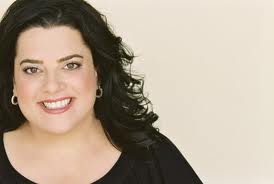
By Pia Guerrero
“How Loving My Body Almost Killed Me”, a Glamour magazine interview with popular body image and self-acceptance advocate, Jess Weiner, hit magazine stands today. As you can imagine, many size-acceptance activists and advocates are not embracing the title–or the piece.
While I assumed the dramatic title was the result of the slick, quick hand of an editor hoping to lure in more readers, it turns out it was actually pulled from Jess’ journal. And that fact reflects the true nature of the article, which is a highly personal piece about Weiner’s journey towards the realization that her definition of body love and size acceptance led her to ignore her health to its detriment.
As an obese woman, Weiner avoided going to the doctor for as long as she could remember in large part because of the bias and the “blame the victim” mentality found at the doctor’s office. So while embracing and promoting body love led Jess to lead a life with confidence and success, she realized she wasn’t truly “loving” her body by putting her head in the sand when in came to her health.
Renowned author of the popular self-help book, The Road Less Traveled, M. Scott Peck notes that, “Love is as love does. Love is an act of will-namely, both an intention and an action.” When we live in a culture that degrades and stereotypes people who don’t fit into the singular “Barbie” beauty ideal, it’s crucial to build self-esteem and self-acceptance by surrounding yourself with counter messaging like “love your body”. We must emotionally love our bodies for how we look at any size. But it’s even more important to love our bodies through loving action: by getting rest, not engaging in high-risk behaviors, getting check-ups, exercising and eating healthily at any size.
Weiner’s journey towards an expanded definition of loving her body began when she decided to got to the doctor. Unfortunately, she learned that she was dangerously close to being pre-diabetic and having high-cholesterol. A huge wake up call, as the diagnosis was a direct consequence of her lifestyle and weight. She joined a gym and learned through a nutritionist how to eat healthily, which led to eating differently (a.k.a dieting) and losing 25 pounds. Weiner writes, “I also started seeing a therapist to work on the emotional baggage I carry and how it plays a part in the way I turn to food for solace, not nutrition.” As a leader in the self-esteem movement who has appeared numerous times on Oprah, it may seem contradictory for Weiner to openly reveal her current internal struggles with her self-esteem and size. Unfortunately, even in the body image movement, we expect our leaders to be perfect in their self-acceptance. Sharing her vulnerability and new outlook has already led some to label Weiner as a size acceptance traitor.
But Weiner is clear that “pursuing your health and vitality is in no way betraying the fact that you care about body acceptance.” She accepts that she will never be thin and remains obese even with her recent weight loss. For Weiner, true love for her body means accepting it as it is and taking actions to be healthy at any size.
Hi-thank you for this,Pia. i think overall this article by Jess in Glamour and the responses, conversation and thinking it has generated is great and can only further clarify the ideas/goals of all of us in the body and body image ‘revolution’ – i think ultimately will help the public understand the concepts of HAES and what it means to love your ‘self’ and your body no matter what size, shape or ability status and no matter what the larger cultural messages are. Body acceptance/ love also means learning how to do deep and radical self-care. This can be really hard to do given the cultural context and prevailing attitudes towards girls and women’s bodies. Self-care is a process of learning and growth – Learning to feed oneself from a place of deep self-love, awareness and mindfulness (paying attention to hunger/satiety and also learning what are the best food choices for one’s own body, where your food comes from, doing preventative care,going to doctors that are sensitive, supportive and knowledgable and advocating for people who do not have access to these resources) – – I appreciate Jess’s vulnerability in disclosing her own conflicts with self-care and the importance she places on therapy as a means of getting clearer on what self-love really means.
It is possible to be healthy and obese. I dated a guy who was obese and biked up to 80 miles a week. He was extremely muscular *and* fat. There is no “one size fits all” approach to personal size as it relates to health. I was an unhealthy thin person with 33% body fat and high cholesterol at 106 pounds at 5 feet. I changed my diet and began exercising. Now with more muscle, I’m 110 and much healthier.
I attended the Own Your Beauty session at BlogHer this weekend and was taken by Jess’s news. I was happy to hear she was taking control of her health. But I did wonder how this whole Glamour thing was going to shake out. I’m not going to pick up a copy so I appreciate your summary here.
I don’t think body acceptance and being healthy are opposing concepts. I wonder why it’s so often depicted that way? Skinny doesn’t equal fit. I know so many “heavy” people who are far more fit than I. Who work out harder than I and put far nutrients in their body than I. We have so much work to do!